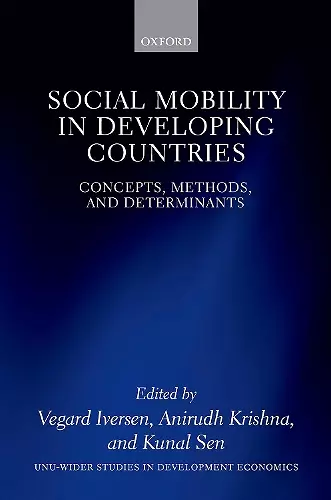Social Mobility in Developing Countries
Concepts, Methods, and Determinants
Anirudh Krishna editor Kunal Sen editor Vegard Iversen editor
Format:Hardback
Publisher:Oxford University Press
Published:21st Dec '21
Currently unavailable, and unfortunately no date known when it will be back

Social mobility is the hope of economic development and the mantra of a good society. There are disagreements about what constitutes social mobility, but there is broad agreement that people should have roughly equal chances of success regardless of their economic status at birth. Concerns about rising inequality have engendered a renewed interest in social mobility--especially in the developing world. However, efforts to construct the databases and meet the standards required for conventional analyses of social mobility are at a preliminary stage and need to be complemented by innovative, conceptual, and methodological advances. If forms of mobility have slowed in the West, then we might be entering an age of rigid stratification with defined boundaries between the always-haves and the never-haves-which does not augur well for social stability. Social mobility research is ongoing, with substantive findings in different disciplines--typically with researchers in isolation from each other. A key contribution of this book is the pulling together of the emerging streams of knowledge. Generating policy-relevant knowledge is a principal concern. Three basic questions frame the study of diverse aspects of social mobility in the book. How to assess the extent of social mobility in a given development context when the datasets by conventional measurement techniques are unavailable? How to identify drivers and inhibitors of social mobility in particular developing country contexts? How to acquire the knowledge required to design interventions to raise social mobility, either by increasing upward mobility or by lowering downward mobility?
This collection of essays offers valuable insights on the measurement and meaning of social mobility both as an inherent part of economic development and as a valued outcome. This careful framing and measurement of an inherently long-term process, fraught with challenges even when the best data are available, deepens our understanding of equality of opportunity in a wide variety of countries and circumstances. This book will certainly be a valuable touchstone encouraging more research and thinking about the relationship between growth and mobility. * Miles Corak, The Graduate Center, City University of New York *
Social or economic mobility may well be the most important of all concepts related to social wellbeing, but it is also the most challenging, both conceptually and empirically. In this book, Iversen, Krishna, and Sen have assembled an all-star interdisciplinary group of authors who deftly navigate the labyrinth of different meanings, measures, and dimensions of mobility in the challenging context of low- and middle-income countries. The diversity of methods and perspectives is a real strength of this important contribution. * Francisco H. G. Ferreira, Amartya Sen Professor of Inequality Studies, London School of Economics *
How can people in developing countries attain a better life? How secure are their achievements? Can they avert catastrophic descents into enduring impoverishment? What enables or impedes their upward social mobility, and what interventions might reduce (and prevent the widening of) social and economic inequalities? From diverse disciplinary perspectives, the studies in this book provide vital insights into the challenges of studying and comprehending social mobility in developing countries—and underline the urgency of highlighting the ever-shifting risks and precarity with which most people must grapple in their daily endeavours to sustain (and perhaps even enhance) their wellbeing. * Patricia Jeffery, Professor Emerita in Sociology, University of Edinburgh *
ISBN: 9780192896858
Dimensions: 240mm x 162mm x 31mm
Weight: 914g
512 pages